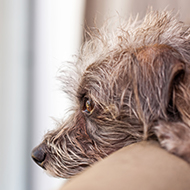'Silver lining' for dog owners in lockdown roadmap delay

Dogs may need a little extra help in adjusting to life after lockdown.
The delay of the government's roadmap out of lockdown is likely a cause of dismay for many. However, for some dogs owners this delay is a 'silver lining', says Dogs Trust. The extra time that this delay gives for dog owners to prepare their dogs for a return to normal life is valuable.
From the beginning of the pandemic in March of 2020, the demand for dogs has soared, with thousands of people welcoming a new dog into their homes over the past year. Not only have new dogs been welcomed into families, but dogs nationwide have spent an increased amount of time with their owners at home over the course of the pandemic. The so-called 'pandemic puppies' may have also missed out on vital experiences for early development.
Behaviour related issues are one of the most significant reasons for dogs being handed into Dogs Trust, and the charity is concerned that lockdown will have had a large impact on dogs' coping skills when left alone. The charity is particularly concerned about whether a rise in separation anxiety-related behaviours due to the impact of lockdown will cause people to give up their dogs.
Director of canine behaviour and research at Dogs Trust, Dr Rachel Casey, said: “The delay to restrictions lifting will be frustrating news for many of us. But for dog owners, it provides an extra opportunity to prepare dogs for the resumption of normal life in four weeks’ time. This is particularly important where there may be major changes to routine planned, such as leaving dogs home alone for the first time when returning to the office.
“Many of us may have already been meeting up in larger social gatherings outside, and allowing visitors into our home. But the next four weeks will allow even more time for owners to refresh their dog’s training, practising friendly visitor greetings and, crucially, getting them used to being left alone to prevent separation anxiety when life goes back to normal.”
Dogs Trust are emphasising the importance of teaching dogs how to deal with being left alone, and have released a 'roadmap for rovers', which provides training advice and guidance to dog owners in order to help their dogs adjust to life after lockdown.
Rachel Casey also said: "A big worry for us is what the long-term impact of lockdown will have on dogs’ ability to cope when left home alone. Dogs that had separation anxiety before the pandemic are likely to get worse when left again as owners head back to work – but we also expect to see new cases developing, because other dogs, and particularly puppies, have learnt to expect company all day. If they expect us to be about all the time, it will be more difficult for them to cope once we eventually go back to our normal lives and aren’t in the house 24/7.
“It is much easier to prevent problems than treat them, and we would urge people to visit our Dog School classes or look at our advice and videos on our website to help prevent these problem behaviours from developing.”
For more information on Dogs Trust's training schemes, visit dogstrust.org.uk/dogschool or dogstrust.org.uk/changethetale



 The Veterinary Medicines Directorate (VMD) is inviting applications from veterinary students to attend a one-week extramural studies (EMS) placement in July 2026.
The Veterinary Medicines Directorate (VMD) is inviting applications from veterinary students to attend a one-week extramural studies (EMS) placement in July 2026.